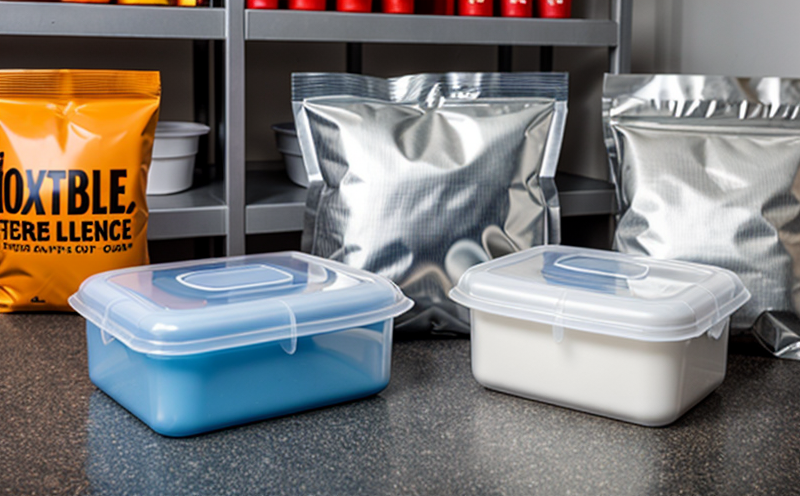ISO 527-5 Mechanical Performance Testing
The ISO 527 series of standards is a set of international guidelines that provide procedures and requirements for mechanical testing of plastics. Specifically, ISO 527-5:2014 deals with the determination of tensile properties of films, sheeting, and similar materials using parallel plate grips. This service ensures compliance with global standards by evaluating how flexible packaging withstands stress under defined conditions.
The test procedure is designed to simulate real-world scenarios where packaging might experience mechanical stress during transport or storage. The process involves clamping a specimen between two parallel plates that move apart at a controlled rate, applying force until the sample breaks. Key parameters include the grip separation speed and the distance over which the force is applied.
Accurate testing under these conditions helps manufacturers ensure their products meet regulatory requirements while also improving product quality and reliability. By adhering to ISO 527-5 standards, companies can demonstrate that their flexible packaging materials are robust enough to endure the rigors of distribution without compromising safety or functionality.
The mechanical performance test is crucial for ensuring that all components of a package work together harmoniously. It allows for optimization of material selection and design, leading to enhanced durability and better protection against external factors such as moisture, temperature changes, and physical impacts. Furthermore, consistent compliance with ISO 527-5 helps businesses maintain their reputation by providing assurance that they are meeting international quality standards.
For those involved in quality management, compliance officers, R&D engineers, and procurement professionals, understanding the nuances of this test can be invaluable when selecting appropriate materials or assessing supplier performance. The insights gained from these tests contribute significantly to informed decision-making processes within manufacturing plants and supply chains.
Industry Applications
The application of ISO 527-5 mechanical testing is widespread across various industries, particularly those dealing with flexible packaging. Here are some key sectors where this service plays a vital role:
- Food and Beverage: Ensuring the integrity of containers used for storing perishable goods like fruits, vegetables, dairy products, etc.
- Pharmaceuticals: Testing packaging used to store medications to ensure they remain stable during transit.
- Biotechnology: Evaluating containers designed for storing sensitive biological samples or reagents.
- Petrochemicals: Assessing the durability of barrels and drums used in oil and gas operations.
By applying this standard, manufacturers can ensure that their flexible packaging meets stringent quality standards, thereby enhancing customer satisfaction and brand reputation. This testing also helps identify potential weaknesses early on, allowing for improvements in design or material selection before products reach the market.
Quality and Reliability Assurance
The importance of mechanical performance testing cannot be overstated when it comes to maintaining high levels of quality and reliability assurance. Compliance with ISO 527-5 ensures that packaging materials are capable of enduring various environmental stresses without compromising their structural integrity.
To achieve this, companies must adhere strictly to the specified test methods outlined in the standard. This includes proper preparation of specimens according to defined dimensions and tolerances, accurate calibration of testing equipment, and consistent application of test parameters such as grip separation speed and load rate.
Regular audits conducted by independent laboratories play a crucial role in verifying that manufacturers are meeting these standards consistently. Such audits help maintain confidence among consumers and regulatory bodies alike. They also provide valuable feedback for continuous improvement initiatives aimed at enhancing overall product quality.
In addition to internal checks, third-party certifications based on successful completion of ISO 527-5 tests can serve as powerful marketing tools that reassure customers about the reliability and safety of purchased products. These credentials add significant value by fostering trust between producers and end-users, ultimately driving sales growth and long-term customer loyalty.
Use Cases and Application Examples
| Use Case | Description |
|---|---|
| Testing Seal Integrity: | Ensuring that packaging seals properly under stress to prevent leaks or breaches. |
| Evaluating Edge Strength: | Determining the resistance of edges against tearing during handling and use. |
| Assessing Tear Resistance: | Making sure that packaging remains intact even when subjected to pulling forces. |
| Checking Flexibility: | Evaluating how easily the material can be bent or folded without breaking. |
| Verifying Strength Under Load: | Testing the ability of packaging to withstand specified loads during storage and transportation. |
| Monitoring Stretch Properties: | Evaluating the stretchability of materials used in flexible packaging to maintain form stability. |
| Assessing Impact Resistance: | Determining how well the material protects contents from impact damage during handling. |
| Ensuring Compatibility: | Verifying that different layers of packaging work together seamlessly without causing deformation or failure. |
The above use cases highlight some critical aspects that mechanical performance testing addresses. By addressing these points, companies can ensure their products are robust enough to meet the demands placed upon them by various environmental conditions and operational requirements.





